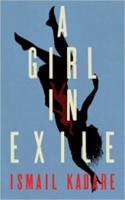
Harvill Secker (2016) h/b 186pp £16.99 (ISBN 9781846558467).
K. brings us a modest little novel about art, love and death. It’s short—almost a novella—and the language registers a reading age of about 12. This is very much the trade mark style of K. for his musings on life in a paranoid state—in this case, Hoxha’s Albania—all wrapped up in myth, fairy tale and folk law. Here it’s Orpheus.
The story is told through a playwright, Stefa, who upsets the Party Committee by bringing a ghost on stage in his latest play. No socialist realism there. His artistic life is put on hold. Of the three women in his life, two leave him, and one is freed to return, but only after she dies. And as Stefa’s life and work is discussed by the Party Committee, so do the Olympians consider Orpheus’ request—to increase the number of strings on his lyre from seven to nine. He reckons that, now Hades has agreed in principle to the release of Eurydice, the only way he can get past Cerberus is not to charm him—impossible—but to put him to sleep. The extra two strings will allow him to do this. Apollo is the first to enthuse and suggests also increasing the number of Muses from seven to nine. Others think this is the usual case of a mortal pushing his luck. And some think that the deal—not to look back at Eurydice during the journey out of hell—too easy. ‘The challenge should have been at least, say, to have his bride in his bed and not to touch her. There were muttered complaints everywhere about concessions made to artists while others got it in the neck for the slightest mistake.’
The state investigates the most personal aspects of Stefa’s life—his lover, a signed copy of one of his plays sent to an interned fan, his wish to put a ghost on stage. The atmosphere is Kafka and Greene rolled together, and the most frequent answer to questions asked is ‘Better not to know’. Yet despite the darkness there are wonderful moments of high farce, especially when Kadare lets the pompous hang themselves out to dry. Kadare himself was an M.P. under Hoxha, and some say he liked to have his cake and eat it. He was tolerated (‘concessions made to artists’), but when he was allowed to publish, he had to publish abroad. His is a unique voice, and that will get him a Nobel Prize one day. Here, then, a story about art, life and death, and particularly where jurisdiction lies, told in a way that is gripping, dark, funny, bemusing and challenging.
Adrian Spooner
